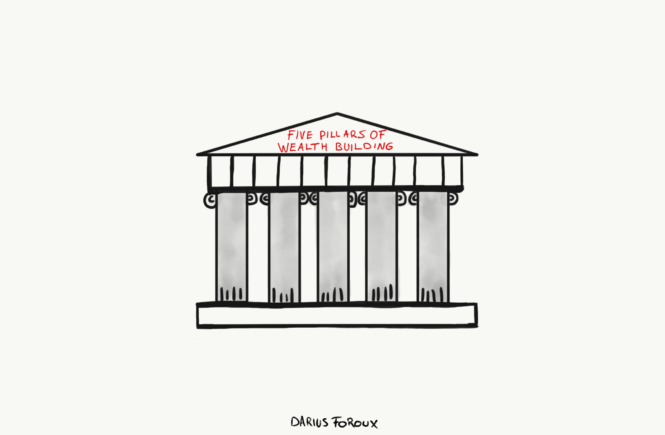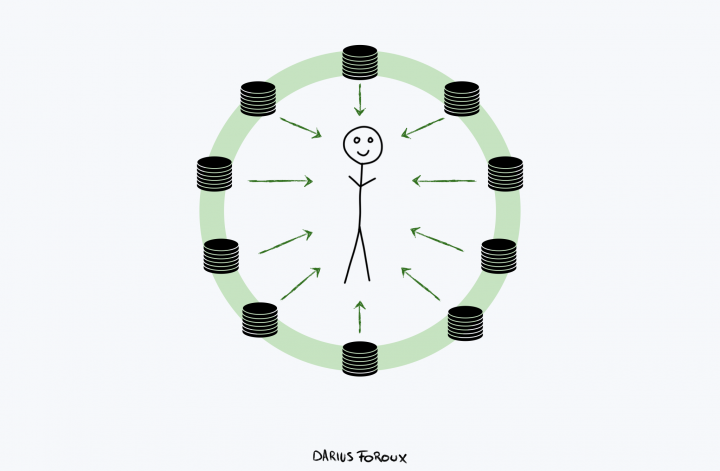Any type of pursuit in life consists of a few fundamental ideas and concepts. For example, theory and experiment have been the two pillars of science for centuries. Those fundamental concepts have solidified our understanding of the world.
It’s the same for wealth building. I’ve identified five pillars that support our understanding of how to responsibly build wealth. You’ll see these concepts everywhere personal wealth is created.
1. Self investing
“To create anything, you need to invest in yourself.” It’s something my father repeated often in our household. He learned this from his father, my grandpa. This is the foundation of every personal pursuit in life.
What do we mean when we say, “That’s a wealthy person”? Or what do we mean when we say we want to build wealth? If you Google the word “wealth”, you’ll get this: “A plentiful supply of a particular desirable thing.”
What is that desirable thing we all want? Is it money? Time? Those are the most obvious answers. But I want to challenge your thinking.
What’s another desirable thing in the modern world? I argue that it’s ideas. If you reverse engineer how people earn money, it always starts with an idea. Every invention, business, product, and career has started with an idea. Hence, my argument:
An abundant supply of ideas is the first pillar of wealth building. It’s the spark that lights the fire.
Investing in yourself takes time. And when you’re in the process, you don’t see any benefits from it. Steven Covey, author of The 7 Habits Of Highly Effective People, said it best:
“Be patient with yourself. Self-growth is tender; it’s holy ground. There’s no greater investment.”
Here are some thoughts on how you can invest in yourself:
- Learn how to build something—Wealth is value. If you know how to create something valuable with a few resources, you can create value.
- Learn a valuable skill that relatively few people have—Why are surgeons wealthy? They can save lives.
- Build a network of people who are doing well in life—Wealth is not a solo pursuit. Knowing people who can make things happen puts you in a strong position to create value.
- Save enough money to live on for at least 6 months—A lump of cash is not a sign of wealth, unless you can generate more of it. Some people think “saving” is a pillar of wealth, but that’s not true. You save money to have peace of mind, so you can keep investing in yourself.
For most of us, the first pillar of wealth building requires years. It’s not without reason that most wealthy people are in their 50s or older. Sometimes you see a wealthy person in their 30s, but that’s rare. Wealthy 20-somethings are almost non-existent.
Warren Buffett, who had read all books on investing by age 10, was wealthy very early on. In his late 20s, he could have retired from work if he wanted. By then, he was already investing in himself for nearly 20 years, though.
2. Income generation
Having ideas without execution is like having a bow without an arrow. You want to put your ideas to work. If you do that, you can start creating value. And when we create value, we generate income.
Most people work because they want a supply of money. And money is what you need to start building wealth. Hence, my argument:
Being able to generate income with your ideas/knowledge is the second pillar of wealth building because you have to start somewhere.
Too often, we want to skip the income generation pillar of wealth. We want to start investing in assets because we know that assets generate value without our own labor. But I never understand how one can make that jump.
In the early 2000s, millions of people were told a lie in the US housing market. “You don’t need income, just buy houses and rent them out, the property value will increase, and you make money when you sell it.”
On the surface, it sounds great. But how can you generate income without tenants? You still have to pay the bank. What if property prices don’t increase that much?
Whether we like it or not, we all need to create value with our skills. The argument that scammers make is: “Who’s wealthier? The restaurant owner or the waiters?” You can use that example for everything. Who’s wealthier? The property owner or the tenant?
Sure, restaurant owners have the ideas, skills, and productivity to create wealth. They need to get many things right to generate wealth. But it’s not that easy. As I’m writing this article, we’re still impacted by the coronavirus crisis and most restaurants are not operating at full capacity. You see, there are always risks.
The restaurant owners now need other ideas to generate income. Building wealth is not easy. You need a constant supply of ideas to turn that into a supply of income.
3. Asset investing
The third pillar of wealth building is investing in assets—anything that will increase your wealth without personal labor. This is the most popular pillar because we all want to build wealth without putting in the hours.
Investopedia describes an asset as “anything of value or a resource of value that can be converted into cash.”
Most people think of real estate when they think of assets because it’s a physical asset. Obviously, real estate is an asset because it supplies one of the most valuable things in life; shelter. Having a quality piece of property at a good location generates cash. But there are many types of assets that generate cash:
- Businesses: This is a broad asset class. You can buy dividend-stocks on the market, and these companies will pay you a share of the profit. You can also start your own business. If the business is profitable, the capital you invest in the business will come back to you through profit. You can also buy into other private businesses. Any type of asset that can be used to grow a business falls into this category. Think of machinery, equipment, devices, etc.
- Bonds: When you invest in bonds, you become a debt-collector. You collect interest just like your bank is collecting on your mortgage (if you have one). That’s how bonds generate cash.
- Books: Most of the books I buy are published years or decades ago. The authors or publishing companies who own the rights still earn money off it. A good book is timeless and will generate cash for a long time.
- Music: In 2016, Sony bought half of Michael Jackon’s catalog for $750 million. That means Michael’s songs were valued at $1.5 billion. No matter how controversial Michael Jackson is, millions of people still stream his music. This generates cash for the rights holder every year. It’s the same for movies. I’ve simply mentioned books and music here to show that the only assets in the world are not stocks and bonds.
Some people like to classify assets as current (easily transformed into cash, like stocks) or non-current (land). I prefer to look at assets as cash-generating or not. Here are a few assets that don’t generate cash but might increase in value.
- Land: A piece of land by itself will not generate cash unless you rent or lease it. If you don’t do that, you only convert your investment into cash when you sell the land. But land can definitely become cash-generating. Some investors rent the land out to solar energy companies.
- Art: This is one of the oldest assets of the modern world. We’ve been buying and selling art for many years. But a piece of art that’s on display in your home doesn’t generate cash. Again, there are ways to generate cash with art, but that’s not a given.
- Collectibles: Watches are a good example. For years, people have been collecting quality watches. These watches also don’t generate cash unless you sell them.
Every investor has a different appetite for risk. What matters is that we invest our money in anything of value. For example, a car, no matter how great and useful it is, will not generate cash unless it’s a direct part of a business. For transportation companies, their vehicles are their biggest assets.
But my personal car will not generate me extra cash. It just brings me to my office. I can drive a Volkswagen or a Bentley, but my work will still be the same. The Bentley will only decrease in value faster.
4. Asset protection
When you build wealth, you want to protect that from external factors. Once you’ve acquired some wealth, you’re a target. That means you want to keep your assets safe from legal situations. This is the fourth pillar of wealth building.
You want to structure your wealth in a way that minimizes your risk. This has everything to do with financial laws. The point of asset protection is that you want to mind your own business and make sure your assets are protected at the same time.
And when you do get claims for any reason, you’ll be in a stronger position to handle that if you have your asset protection strategy in order. Some people also think of tax laws when they talk about asset protection. While I’m a proponent of paying taxes, you don’t want to pay more than required.
At this stage of wealth building, you’ll have lawyers and accountants who take care of these things. It’s the least interesting and exciting part of wealth building, but it deserves to be mentioned.
5. Capital allocation
At some point, you’ve acquired so much wealth that the only thing you’re doing is moving around your resources. This is the fifth and final pillar. You might sell one stock and buy another one. You might liquidate a business and start a new one.
You might sell land and buy a cash-generating asset. And all the while, you’re still generating value and cash. This is all that Berkshire Hathaway does. They are in the capital allocation business.
You simply look at where the opportunities are for the biggest return. Now, if you’re an ethical investor like Warren Buffett, you allocate your capital in a way that value and jobs are created. You keep the wealth flowing and you don’t hoard it. What’s that good for? Hoarding money and wealth is fearful behavior. Successful investors put their wealth to work, not to rest.
Ultimately, that’s the purpose of investing: To increase the pie. People who want to take a bigger piece of the existing pie are the parasites of our society. Those people are the zero-sum thinkers.
The ones who allocate their capital to things that make the world better are the ones who contribute to progress. These are the people who build new businesses, develop real estate, or create technology that increases the size of the pie.
Building wealth is always a group activity. I never understand why people are against progress and change. I do understand why some people don’t like those things. Progress is hard and requires effort.
But if you do it right, wealth building will not only benefit you and your family, it will also generate an impact on the economy, jobs, and lives of other people.




